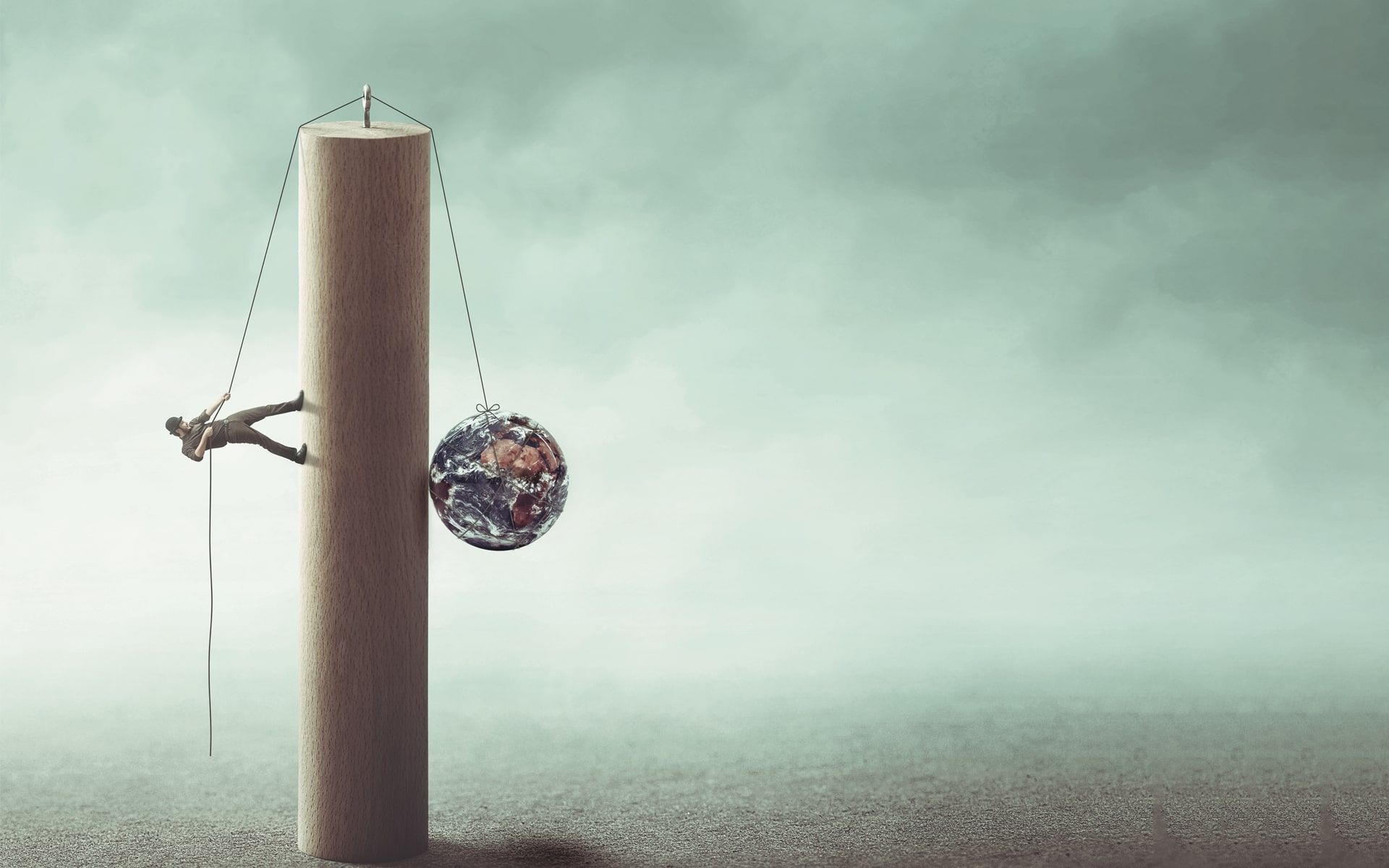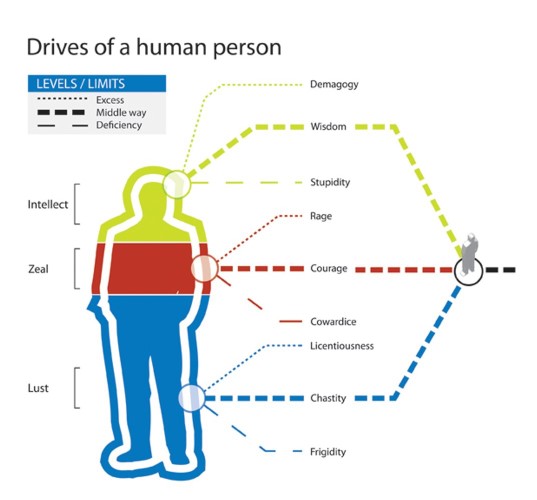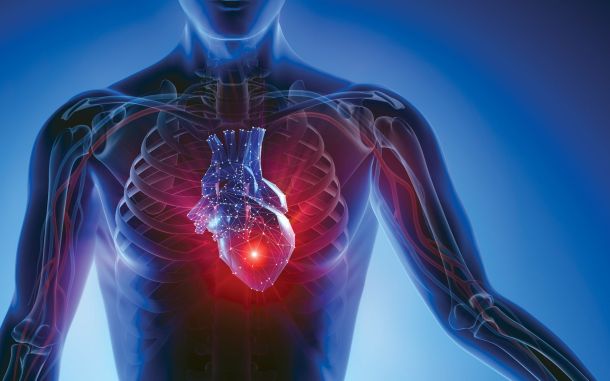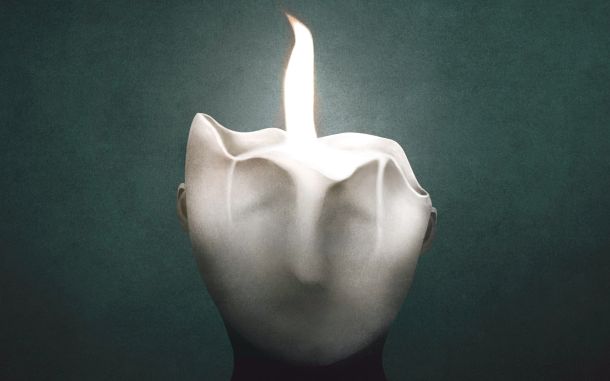
Democritus (460-370 BC), an ancient Greek philosopher, described the human being as “a world in miniature” akin to a microcosm. A human being is an image of the cosmos (macrocosm) that surrounds us by virtue of containing all the facets of reality: body, mind, and spirit. The Stoic approach understood humanity in the framework of the cosmic order as a microcosm that reflects upon the macrocosm of the physical universe [1]. In a similar way, Islamic scholars consider human beings as a sample or a model of the universe and symbolize them as mirrors of God’s names and attributes on the earth, thus the essence and the vital element of being, the index and core element of the universe and societies.
“The middle way” is an important concept in order to understand our place as human beings in nature and how this relationship manifests in culture, history, and institutions. Individual and collective happiness lies, according to many Islamic scholars, in disciplining three innate faculties of a human person: reason, anger, and lust. This is, to a great extent, similar to Aristotle’s conceptualization. Aristotle criticized the Platonic “virtue-versus-vice” categorization and classified phenomena in three groups, two of which are vices (excess and deficiency) and one of which is virtue (the mean or the middle way). In their daily prayers, Muslims entreat about forty times to maintain on “the middle way” (al-sirat al-mustaqim) and be protected from excess (ifrat) and deficiency (tafrit) (Qur’an 1:7).

Since the time of Ibn Miskawayh, a prominent Muslim scientist who lived in ca. 930–1037, human faculties or drives have been dealt with in three categories—intellect, zeal, and lust. The first category of intellect or reason enables a person to make the right decision and encompasses all of our capabilities such as conception, imagination, calculation, memory, learning, and so on. The second category of zeal or anger covers the power of self-defense, which according to Islamic jurisprudence is defined as that which is needed to defend faith and religion, sanity, possessions, life and family, and other sacred values. Thirdly, each man and woman desire, or lust, after the opposite sex, and love their children and worldly possessions. In other words, lust or desire is the name for the driving force of one’s animalistic appetites. Figure 1 visualizes these three drives or faculties of the average person, and its each virtue and its two extremes (levels/limits) [2].
“The middle way” could collectively be considered to be the reasonable, just, and fair balance of the three humanistic drives, which correspond to three middle way positions: wisdom (for intellect), courage (for zeal), and chastity (for lust). For instance, the excess of the intellect is demagogy or sophistry, while its deficiency is stupidity, and its middle way is wisdom. As for zeal, its two extremes are rage and cowardice with courage being the compromise of the two. Chastity is the middle way of lust whose extremes are licentiousness and frigidity [3].
In sum, the extremes for the three drives are over-the-top and result in some form of wrongdoing or injustice, whereas the middle ways aim to establish balance and justice. A most important characteristic of the ideal human is that he or she finds a balance in the middle way and practices it in all aspects of human life. Such a person can express and reflect the attributes appropriately and comprehensively because he or she does not behave in the extremes of life (excess and deficiency), try to be molded by ethical values and achieve good character.
A moral life
The middle way is the harmony of the inner and outer life. That makes a person balanced and whole. The inner and outer are parts of a whole structure, and in order for this wholeness to be useful at all the existence of both parts is essential. When both aspects come together then our different dimensions of spirituality, thought, and behavior are completely functional and balanced. A peaceful coexistence and integrity between one’s inner and outer worlds are necessary in order for one to gain moral maturity.
In this context and in relation to the “middle way,” we need to consider how moral values interplay with an ideal human life. Morality is the knowledge, behavior, and feelings which comprise what, where, how, and why a person does something. A human’s personality and his or her inborn qualities are neutral and available to be shaped in a certain direction, good or bad. Morality is a key dynamic in this process. Character training, and education about morals, are important ways to discover ethical values. In general, there are two types of morality: that which is innate from birth, and that which is acquired afterwards. These two types of morality are interrelated and illuminate each other. While the first one is more idiosyncratic and is a part of a person’s natural constitution, the second type of morality reflects a person’s personality qualities acquired after birth [4]. Every human person lives in between.
The initial steps of every action, and every kind of work, are ethics and self-knowledge. In spiritual disciplines, self-knowledge requires being mindful of one’s own helplessness, deficiency, and poverty vis-à-vis the Divine. This sort of self-knowledge is believed to be necessary to be a mature human with appropriate morals. A deep, genuine understanding of oneself is closely related to obtaining a person’s own inner and outer uniformity and completeness. Knowledge of oneself does not stem from awareness of one’s physical needs but instead focuses on our more metaphysical aspects. Self-knowledge helps understanding our choices in daily life. This means undergoing an ongoing observation every day by “rereading oneself” in order to get to know ourselves again every day. Our lives are not stagnant and that they are ever growing and morphing, like a tree. Our soul, willpower, and consciousness are the mechanisms that help us to observe and ponder over the occurrences that are related ourselves [5].
The most difficult thing to discover are deviations and constant changes that occur in the inner dimensions of our being. When a person’s inner being changes, his or her choices and expectations change as well. Gaining insight into existence increases self-awareness and self-knowledge—which is considered to be a path to know God—and this comes to opening up to multi-dimensions, i.e., seeing everything not only with their outward forms but with their functions, duties, and inner qualities. The ones who can open themselves to multi-dimensions go beyond the narrow frames of their physicality and construct their moral personality accordingly. Moral personality manifests with the manners, behavior, persuasions, evaluations, comments, views, and interpretations of a person. In this case, every human has an image that is shaped according to his or her inner moral personality [6].
Four principles recalling ethical values
“Everyone acts according to his or her own disposition” and, thus, displays his or her own character. This Qur’anic principle (17:84) refers to an important step in acquiring good moral values when a person knows, feels, and perceives his or her own mistakes. Without seeing a person’s own fallacies and faults, defects, and deficiencies, it is not possible to stay away from delusions and caprices, and to find the right path. Therefore, it is strongly advised that we become equipped with the tools necessary to consistently make proper self-assessment so that we can remain aware of our shortcomings. In this regard, the following four suggestions could be helpful [7].
- The first one is to find a guide, an educator, or a teacher who will enlighten and inspire the individual to organize his or her life, who will redirect him or her to right path.
- The second is to select a good friend or a coach, a magnanimously brave ally, who reminds one of ethical values and points out one’s fallacies and mistakes.
- The third is to get rid of fallacies and faults and to adopt a good moral point of view. This will allow a person to value what has been said, negatively or positively, about oneself and to question oneself effectively. In this respect, a critically reflective attitude always offers a learning opportunity.
- The fourth suggestion for gaining good moral values, and to eliminate bad habits and immorality, is to be among people and to be involved in human society. This interaction enables each person to learn human values and to discover feelings and emotions about him or herself.
In conclusion: The virtuous generations
The concept of the “ideal human” refers to individuals of spiritual, moral, and intellectual excellence. By virtue of drawing attention to the relationship between the eternal life and a person’s greatest achievement on the earth will be the attainment of a station of the ideal human. This is a prelude to one’s “superlative person,” who lives for others (altruism) at the expense of his or her own life’s pleasures. Such a person will only take positive action in a social arena and will be supposed to absorb and represent both modern realities and timeless moral values and to constitute its identities through its mind, its behaviors, and its spirituality. This is the constant exercise of an ideal person as they seek balance in life.
References
- Pannenberg, W. Anthropology in theological perspective. Philadelphia, PA: The Westminster Press, 1985, p. 27.
- Çelik, G. The Gülen Movement: Building Social Cohesion through Dialogue and Education (PhD thesis, Tilburg University). Delft, NL: Eburon, 2010.
- Gülen, F.G. “Öfkene Hakim Ol” [Control your anger], Vuslat Muştusu, Kırık Testi (vol. 8), 2008, pp. 68-80.
- Nursi, B.S. İşaratü'l-İcaz [Signs of Miraculousness]. Istanbul, TR: Sözler, 1993, pp. 22-23.
- Harman, G. The Nature of Morality: An Introduction to Ethics. Oxford University Press, 1997.
- Gülen, F.G. Sohbet-i Canan [Cordial Conversations]. Kırık Testi (vol. 2), 2004, pp. 169-170.
- Gülen, M.F. Ahlaki Mülahazalar [Ethical Considerations]. Series of sermons. No.3. 1980.








